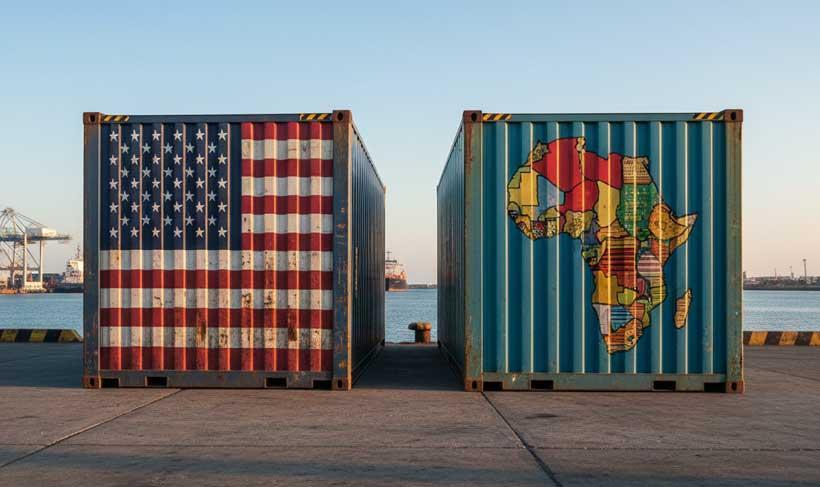By
Kester Kenn Klomegah
Africa-Press – Eritrea. As the geopolitical situation intensifies, with U.S. President Donald Trump imposing huge trade tariffs to either restrict or regulate export transactions to the United States, African leaders and entrepreneurs have mounted critical efforts to renegotiate the extension of AGOA, which expires 30th September 2025. Over the past few years, African leaders have been advocating for large-scale structural reforms, financial inadequacies, and policy approaches by multinational institutions mostly dominated by the United States. Notwithstanding Africa’s huge untapped resources, Africa still looks to the United States and multinational financial institutions to salvage its economy.
In spite of this consistent criticism over current U.S. policy, which has flattened relations with Africa since the ascension of Donald Trump into the White House in Washington, African leaders and exporters are feverishly trying to reaffirm their commitment to deepening their comprehensive strategic trade partnership, desirous to sustain AGOA through which to generate foreign currency incomes to their state coffers. Despite the indelible fact that European and Asian markets are alternatives to explore, African exporters still highly value trade sustainability with the United States. The Africa Growth and Opportunities Act (AGOA), which is expiring on 30th September 2025, should promptly be renewed, as has been the case before; otherwise, it would negatively impact diverse developments across Africa.
What’s AGOA, and Why It Matters for Africa:
The African Growth and Opportunity Act (AGOA), enacted on 18th May 2000, provides eligible sub-Saharan African countries with duty-free access to the U.S. market but is currently due to expire on 30th September 2025. The duty-free access for nearly 40 African countries has boosted development and fostered more equitable and sustainable growth in Africa. By design AGOA is a useful mechanism for improving accessibility to trade competitiveness, connectivity, and productivity. During these past 25 years, AGOA has been the cornerstone of U.S. economic engagement with the countries of sub-Saharan Africa.
In the context of the crucial geopolitical changes, many African leaders, corporate executives, and the business community are still searching for mutually beneficial trade partnerships with the United States. With the changing times, Africa is also building its muscles towards a new direction since the introduction of the African Continental Free Trade Area (AfCFTA), which was officially launched in July 2019. In practical terms, trading started under the AfCFTA from January 2021.
The United States has prioritized the AfCFTA. And the African Growth and Opportunity Act (AGOA), which offers a trade preference program, perfectly fits into that. AGOA provides duty-free access to the U.S. market for eligible products and trading services from designated sub-Saharan African countries. It was enacted in May 2000 and aims to boost economic growth and development in the region through trade.
Sample Case Studies, Trade Volumes with the United States:
The U.S. and South Africa signed a Trade and Investment Framework Agreement (TIFA) as far back as in 2012. The trade agreement establishes a forum for consultative discussions, cooperative work, and possible agreements on a wide range of trade issues, with a special focus on customs and trade facilitation, technical barriers to trade, sanitary and phytosanitary (SPS) measures, and trade and investment promotion. South Africa trade summary records show that U.S. goods and services trade with South Africa totaled an estimated $26.2 billion in 2024.
For instance, South African Trade Minister Parks Tau has held several talks with US Trade Representative Jamieson Greer these months until September 2025, aimed at maintaining trade relations with the United States. South Africa hosts the G20 presidency, and utilizing its G20 presidency as an instrument for negotiating for trade is an opportunity that, when missed, would impactSouth Africa seriously. Many sub-Saharan African countries would face a similar fate seriously without AGOA.
With Angola, the first meeting of the United States-Angolan Council on Trade and Investment was held in June 2010 in Luanda. U.S. goods and services trade with Angola totaled an estimated $3.2 billion in 2024. In June 2025, Luanda, the capital city of Angola, hosted the U.S.-Africa trade summit. The United States has invested in the construction of the Lobito highway corridor.
Its neighboring Central African Republic has U.S. goods and services trade totaling an estimated $74.4 million in 2024.Comparatively, the U.S. goods and services trade with the Democratic Republic of Congo totaled an estimated $1.0 billion in 2024, up 8.4 percent ($79.1 million) from 2023.
The Ethiopia trade summary shows that the U.S. goods and services trade with Ethiopia totaled an estimated $4.3 billion in 2024, up 28.4 percent ($940.2 million) from 2023. Ethiopia has the largest number of its citizens in the United States.
In the bid to diversify its economy from its dependence on crude oil, which accounts for nearly all the value of exports, Nigeria strives to build its agricultural, mining, and manufacturing sectors, especially in the automotive assembly, cement, textile, and clothing sectors. This has led to talks and negotiations of trade agreements with the United States. Nigeria also has a large number of its citizens domiciled in America. U.S. goods and services trade with Ghana totaled an estimated $3.8 billion in 2024, while with Nigeria it totaled an estimated $13.0 billion in 2024, up 16.5 percent ($1.8 billion) from 2023. With Tanzania, it totaled an estimated $1.4 billion in 2024.
Key features and benefits of AGOA:
It’s worth reiterating here that during these past several years, AGOA has been the cornerstone of U.S. economic engagement with the countries of sub-Saharan Africa. In this case, as AGOA is closely working with the African Continental Free Trade Area (AfCFTA) Secretariat and with the African Union (AU), trade professionals could primarily leverage various economic sectors and unwaveringly act as bridges between the United States and Africa.
Duty-free Access: AGOA allows eligible products from sub-Saharan African countries to enter the U.S. market without paying tariffs.
Promotion of Economic Growth: The program encourages economic growth by providing incentives for African countries to open their economies and build free markets.
Encouraging Economic Reforms: AGOA encourages economic and political reforms in eligible countries, including the rule of law and market-oriented policies.
Increased Trade and Investment: The program aims to strengthen trade and investment ties between the United States and sub-Saharan Africa.
Economic Growth and Employment Creation: AGOA has been instrumental in creating employment by raising exports. It further encourages raising exports to the United States. In addition, AGOA has helped eligible countries to work towards economic growth across the African continent. It establishes the process of transforming a market-based economy and sets the criteria for diversification and strengthening trade policy interests between the United States and Africa.
Recent Developments: AGOA’s authorization is scheduled to expire in September 2025. The ongoing debates have intensified, with the majority of African leaders calling for its extension. This implies affirmation of United States policy by Africa and its evolving position within the context of multipolarity. The Corporate Council on Africa (CCA) has taken robust steps and adopted a fast-tracking approach to rally African leaders and the U.S. Congress to promptly renew AGOA. The CCA, established in 1993, provides unparalleled access to high-level decision-makers, curated networking opportunities, market intelligence, and a platform to shape policy and drive business.
Arguments for U.S.-Africa as Inseparable Biological Twins:
Besides the indelible benefits of the African Growth and Opportunity Act (AGOA), some African strategists and research analysts indisputably believe that financial remittance flow is definitely one of the surest reliable sources of foreign exchange, depending solely on the dollar currency, to support trade.
In its latest report released in June 2024, the World Bank indicated that, despite the geopolitical uncertainties, instability, and challenges, sub-Saharan Africa’s remittance flow reached US$54 billion in 2023. According to World Bank statistics, remittance inflows to sub-Saharan Africa stood at US$49 billion in 2021.
The U.S.-African Diaspora Factor:Over the years, African leaders have been engaging with their diaspora, especially those excelling in academia, business, science, technology, engineering, sports, and other fields that the continent needs to optimize its diverse potentials and to meet development priorities. These professionals primarily leverage various sectors and act as bridges between the United States and Africa. Beyond remittances, Africa stands to benefit largely from the input of its diaspora considered as progressive in the United States. Looking ahead for ensuring the trade between the United States and Africa, therefore, requires reviewing measures such as trade policy, trade facilitation, productive capacity, trade-related infrastructure, trade finance, trade information, and factor-market integration.
In an analytical summary, AGOA is a significant trade policy that has played a crucial role in promoting economic growth and development in sub-Saharan Africa. Beyond that, it is therefore necessary for African leaders, the U.S. government, both U.S. and African trade agencies, the private sector, civil society, and stakeholders to combine the African Growth and Opportunity Act (AGOA) and the Africa Continental Free Trade Agreement (AfCFTA) as the cornerstone in strengthening a new path towards economic partnership with Africa. The logical AGOA extension is unreservedly supported by the African Union (AU) and Regional Economic Blocs. The tremendous growing potential of the African Diaspora and its inseparable cultural involvement in trade and economic sectors makes it an imperative lifeline for prompt extension and the sustainability of the African Growth and Opportunity Act (AGOA).
moderndiplomacy
For More News And Analysis About Eritrea Follow Africa-Press







